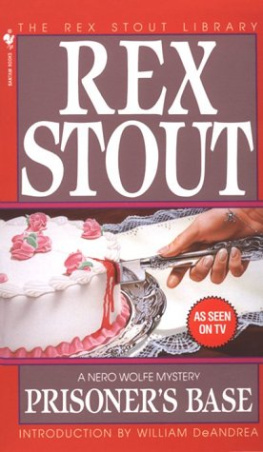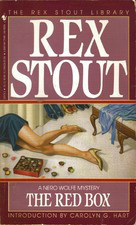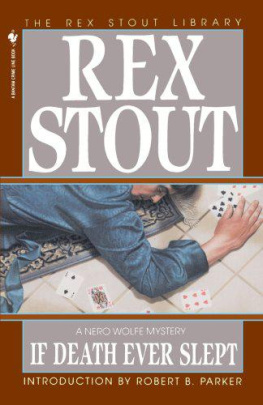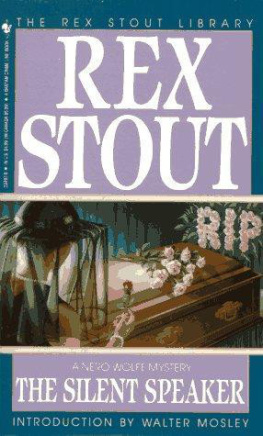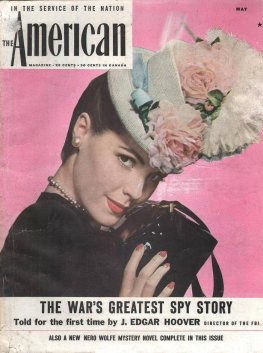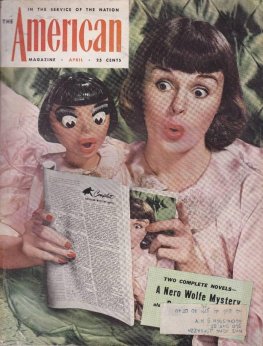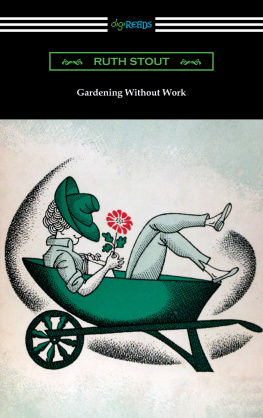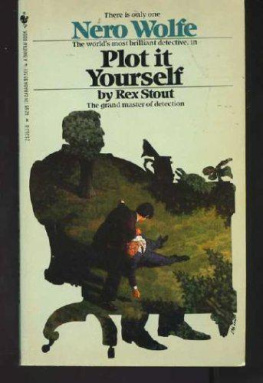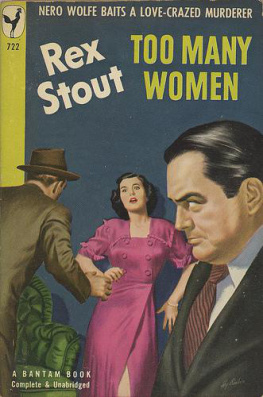Rex Stout - Prisoners Base
Here you can read online Rex Stout - Prisoners Base full text of the book (entire story) in english for free. Download pdf and epub, get meaning, cover and reviews about this ebook. year: 1992, publisher: Crimeline, genre: Detective and thriller. Description of the work, (preface) as well as reviews are available. Best literature library LitArk.com created for fans of good reading and offers a wide selection of genres:
Romance novel
Science fiction
Adventure
Detective
Science
History
Home and family
Prose
Art
Politics
Computer
Non-fiction
Religion
Business
Children
Humor
Choose a favorite category and find really read worthwhile books. Enjoy immersion in the world of imagination, feel the emotions of the characters or learn something new for yourself, make an fascinating discovery.
- Book:Prisoners Base
- Author:
- Publisher:Crimeline
- Genre:
- Year:1992
- Rating:3 / 5
- Favourites:Add to favourites
- Your mark:
- 60
- 1
- 2
- 3
- 4
- 5
Prisoners Base: summary, description and annotation
We offer to read an annotation, description, summary or preface (depends on what the author of the book "Prisoners Base" wrote himself). If you haven't found the necessary information about the book — write in the comments, we will try to find it.
Prisoners Base — read online for free the complete book (whole text) full work
Below is the text of the book, divided by pages. System saving the place of the last page read, allows you to conveniently read the book "Prisoners Base" online for free, without having to search again every time where you left off. Put a bookmark, and you can go to the page where you finished reading at any time.
Font size:
Interval:
Bookmark:
I'd read some Sherlock Holmes as a kid, and I watched a lot of tough private eyes on TV. But I didn't really get hooked on mysteries until I was twelve years old. And no, it wasn't Stout who first got me, it was Ellery Queen. But I ran into the problem that plagues all true mystery fans-I read faster than my favorite author could write. When Queens grew hard to come by, I turned to my mother, the other mystery junkie in the family, and said, through pangs of withdrawal, "Who else is good?" She told me her own favorite was Rex Stout. I didn't have anything to lose, so I plunged in. I started slowly, with novelettes reprinted in Howard Haycraft anthologies: "Die Like a Dog" and "Instead of Evidence."
Wow.
King Rex had joined the Queen. I mean, even as a kid I could see Stout's genius, and I could see that the genius resided in the creation of Archie Goodwin. Nero Wolfe was great, but great as he was, he was a master detective, and I'd seen a lot of those before. Wolfe might have been an updated Mycroft Holmes.
But, my youthful self judged (and I've never found a reason to change my mind), this Goodwin character was something new. He was a Watson in that he told the story and was frequently left panting behind in the great man's tracks, but there was nothing worshipful about him. He was a tough guy, but unlike too many tough guys, he had no chip on his shoulder. He could work for a man he acknowledged to be his mental superior without having to shelve his own sense of self-worth. He knew what he brought to this particular partnership. In fact, Archie's deflations of Wolfe are what make Wolfe a human and (dare I say it?) lovable figure, rather than the off-putting freak he might have been if a lesser author had given him a lesser sidekick.
I may have grown to resemble Wolfe, but I always identify with Archie.
Stout also used Archie's up-to-date vernacular to put across some very old-fashioned values. "It is most important for you to feel you have earned your fee," Wolfe says. Or, "I rarely make promises, because I would redeem one, tritely, with my life." Or Archie will make a remark about racism: "When I feel superior to someone, as I frequently do, I need a better reason than the color of my skin."
I spent many happy hours, through adolescence and adulthood, immersed in this stuff and still gladly plunge back in today. Because along with all his other virtues, Rex Stout is the most rereadable author in the history of the genre.
All of this Stout-Wolfe-Archie exposure at an impressionable age has made indelible marks on my outlook, my patterns of thought, even my style as a writer. Several readers have told me that my first-person style reminds them of Stout's and that a certain character of mine, to quote one of them, "could be Archie Goodwin's younger brother." As far as I'm concerned, that's the best praise I can hear.
Now I want to talk a little about this particular book.
There's something ridiculous about having a favorite Rex Stout book. The man sustained an amazing level of excellence for such a long time, it seems foolish to single one out. It's like having a favorite Elvis record.* (*But of course I've got one-"Suspicious Minds" (1968).)
Nevertheless, when I was offered the choice of which book to do, Prisoner's Base was the one I chose instantly. Why? Because it shows Wolfe and Archie at their romantic (in the swashbuckling sense) best. Because, as in just a few other books (The Silent Speaker, for instance), we have a case that really gets under Archie's skin. We've got the regular gang in top form (although Lily Rowan is, alas, absent), and we have plenty of the Stoutian spear carriers (Dewdrop Irby, Andy Fomos) to bring Wolfe's New York to life. If you were going to pick one book to introduce a friend to Wolfe, you couldn't pick a better one than Prisoner's Base.
But this book has something else going for it, too: a dazzlingly simple-and simply dazzling-plot gimmick. Great as he was, plotting classic mystery puzzles wasn't Stout's strongest suit. But every once in a while he'd come up with a clue for the ages. The League of Frightened Men has a solution like that. So does Prisoner's Base. I envy those of you who are about to read it for the first time.
William L. DeAndrea
Watertown, Connecticut
What had stirred it up was a comment made by Wolfe three days earlier. Each Friday morning at eleven, when he comes down to the office on the first floor from the plant rooms on the roof, Wolfe signs the salary checks for Fritz and Theodore and me, hands me mine, and keeps the other two because he likes to deliver them personally. That morning, as he passed mine across his desk, he made a remark.
"Thank you for waiting for it."
My brows went up. "What's the matter? Bugs on the orchids?"
"No. But I saw your bag in the hall, and I note your finery. Straining as you are to be gone, it is gracious of you to wait for this pittance, this meager return for your excessive labors in the week nearly ended. Especially since the bank balance is at its lowest point in two years."
I controlled myself. "That deserves an answer, and here it is. As for finery, I am headed for a weekend in the country and am dressed accordingly. As for straining, I am not." I glanced at my wrist. "I have ample time to get the car and drive to Sixty-third Street to get Miss Rowan. As for pittance, right. As for excessive labors, I have had to spend most of my time recently sitting on my prat only because you have seen fit to turn down four offers of jobs in a row. As for the week nearly ended, meaning that I am dashing off to carouse before the week is out for which I am being paid, you've known about it for a month, and what's here to keep me? As for the bank balance, there I admit you have a point. I'm the bookkeeper and I know, and I'm willing to help. It's only a pittance anyway, what the hell."
I took my check, with thumbs and forefingers at the middle of its top edge, tore it across, put the halves together and tore again, dropped the shreds into my wastebasket, and turned and started for the door. His bellow came at me.
"Archie!"
I wheeled and glared at him. He glared back. "Pfui," he said.
"Nuts," I said, and turned and went.
That was what created the atmosphere. When I returned from the country late Sunday night he had gone up to bed. By Monday morning the air might possibly have cleared if it hadn't been for the torn-up check. We both knew the stub would have to be voided and a new check drawn, but he wasn't going to tell me to do it without being asked, and I wasn't going to do it without being told. A man has his pride. With that between us, the stiffness Monday morning lasted through lunch and beyond, into the afternoon.
Around 4:30 I was at my desk, working on the germination records, when the doorbell rang. Ordinarily, unless instructions have been given, Fritz answers it, but that day my legs needed stretching and I went. Swinging the door open, I took in a sight that led me to an agreeable conclusion. The suitcase and hatbox could have held a salesman's samples, but the young woman in the light peach-colored dress and tailored jacket was surely no peddler. Calling on Nero Wolfe with luggage, ten to one she was a prospective client from out of town, and, coming straight from the station or airport, in a hurry. Such a one was welcome.
Font size:
Interval:
Bookmark:
Similar books «Prisoners Base»
Look at similar books to Prisoners Base. We have selected literature similar in name and meaning in the hope of providing readers with more options to find new, interesting, not yet read works.
Discussion, reviews of the book Prisoners Base and just readers' own opinions. Leave your comments, write what you think about the work, its meaning or the main characters. Specify what exactly you liked and what you didn't like, and why you think so.

